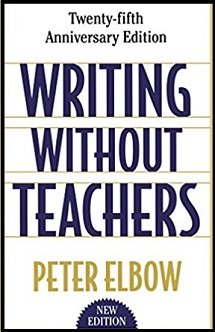WRITING WITHOUT TEACHERS
TABLE OF CONTENTS
Introduction to the Second Edition xi
1 FREEWRITING EXERCISES 3
How freewriting exercises help 4
Freewriting and garbage 7
Keep a freewriting diary 9
Using freewriting exercises for finding subjects to write about 9
Producing a finished piece of writing 10
2 THE PROCESS OF WRITING--GROWING
Autobiographical digression 16
It makes a difference in practice 18
Growing 22
Start writing and keep writing 25
Chaos and disorientation 30
Emerging center of gravity 35
Editing 38
Growing as a developmental process 42
3 THE PROCESS OF WRITING--COOKNG
Cooking as interaction between people 49
Cooking as interaction between ideas 50
Cooking as interaction between words and ideas, between immersion and perspective 51
Cooking as interaction between metaphors 53
Cooking as interaction between genres and modes 54
Cooking as interaction between you and symbols on paper 55
Noncooking 56
Desperation writing 60
The goal is cooking 64
Cooking and energy 67
Goodness and badness 69
Why the old, wrong model of writing persists 70
Conclusion 72
4 THE TEACHERLESS WRITING CLASS 76
Setting up the class 78
Giving movies of your mind 85
Further advice to readers 93
Advice to the writer on listening 101
The Class process 106
5 THOUGHTS ON THE TEACHERLESS WRITING CLASS 117
How I came to this approach 117
Huh? 121
Why the teacherless class helps make writing easier 124
Why the teacherless class helps make writing better 127
People learn from the truth, even though the truth is a mess 133
The process of learning writing 134
What about grammar? 136
The yogurt model 139
Subjective bullshit 140
Multiple-choice diary 141
Appendix Essay: THE DOUBTING GAME AND THE BELIEVING GAME -- AN ANALYSIS OF THE INTELLECTUAL ENTERPRISE 147
The monopoly of the doubting game 149
The truth about meaning and words 151
Short digression on the New Critics 158
Why the doubting game doesn't work with assertions of meaning 159
The believing muscle 162
Meaning-making as gestalt-making
The myth of the laboratory rat 168
Believing and doubting as dialectics 169
The two dialectics as games 174
The believing game in action: fighting the itch for closure 176
The two games as reinforcers of different character traits 178
Fears of the believing game 181
Speculation on the history of the believing game 187
Conclusion: the interdependence of the two games 190
Appendix: A COUPLE OF NOTES TO MYSELF 193
WORKS CITED 199
A FEW BOOKS TO HELP WITH CORRECT USAGE 201
REMINDERS TO KEEP IN VIEW DURING A TEACHERLESS WRITING CLASS 205

Oxford University Press, 1973

